NCERT Solutions for Class 4 Maths - Tick Tick Tick
Page No 36:
Ques 1: Three friends read time from a clock. Who is right?
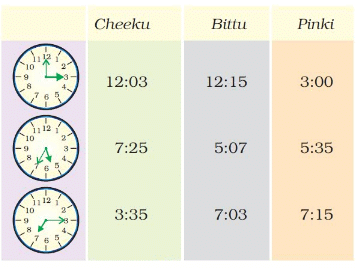
Ans: In the first clock, the hour hand is at 3 and the minute hand is at 12. So, it is 3:00. Pinki tells the correct time for the first clock.
In the second clock, the hour hand has passed 5 and the minute hand is at 7. So, it is 5:35. Pinki tells the correct time for the second clock.
In the third clock, the hour hand has passed 7 and the minute hand is at 3. So, it is 7:15. Once again, Pinki is correct.
Page No 37:
Ques 1: Show the following times in the clock

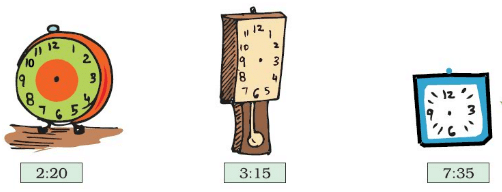
Ans:

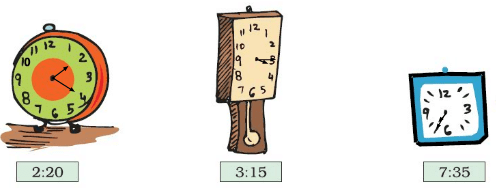
Ques 2: Do you like sky watching? If yes, then this one should interest you:
(a) At what time does the sun rise at your place?
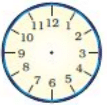
(b) When does the sun set?
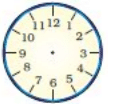
• Does the sun rise and set at the same times every day?

• Look at a newspaper and see the time of sunrise and sunset in different months.
Ans: (a) The Sun rises at 5:30 am at my place
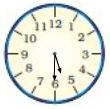
(b) The Sun sets at 7:30 pm at my place.
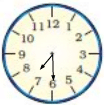
Page No 38:
Ques 1: Find out
How long will it take the minute hand to move from




Ans:
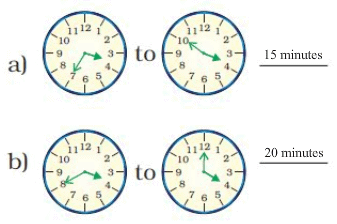
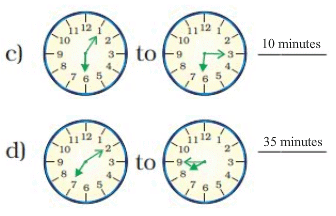
Page No 39:
Ques 1: Find out
Draw where the hands will be:
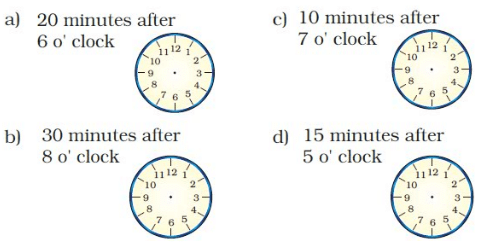
Ans:
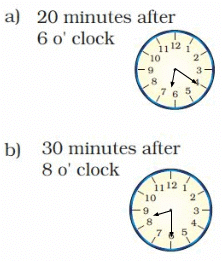
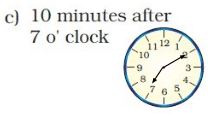
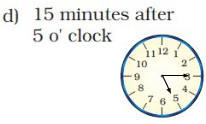
Page No 40:
Ques 1: Find out
How many minutes can these activities take? Make a guess and then check at home.

Ans: Boiling 1 litre milk takes around 4‒5 minutes.
Filling a bucket takes around 3‒4 minutes.
Sweeping the room takes around 7‒8 minutes.
Page No 41:
Ques 1: Let’s look at a clock again! Solve this one —
(a) The minute hand started from ‘2’. How many minutes will it take to come back to ‘2’ again? ____________
(b) What happens to the hour hand? Does it also move? How long will it take to move from one number to the next?
(c) Look around you and list the activities that take about one hour to complete.
1. _________________
2. _________________
3. _________________
4. _________________
5. _________________
Ans: (a) The minute hand will take 60 minutes to come back to 2 again.
(b) Yes, the hour hand also moves. It takes 1 hour or 60 minutes to move from one number to the next number.
(c) Following are some of the activities that take about one hour to complete:
1. Cooking food
2. Watching a cartoon episode
3. Getting ready for school
4. Playing with friends
5. Doing homework
Ques 2:
• Ask your father if he can cook as fast as your mother does. Yes / No
• Which games take less than an hour to finish? ____________
• How long does a football match take?
Ans: Games that take less than an hour to finish are Snakes & Ladders, playing cards, Tambola, etc.
The duration of a football match is 90 minutes.
Page No 43:
Ques 1: Here are some pages from Rani’s Diary — Mark these in the correct order on Muniya’s Time Line.
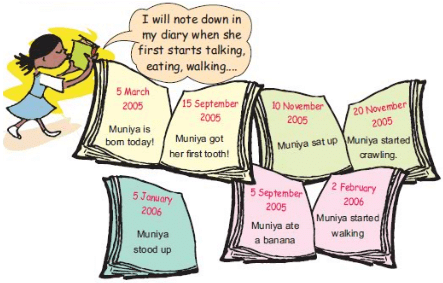
Ans:
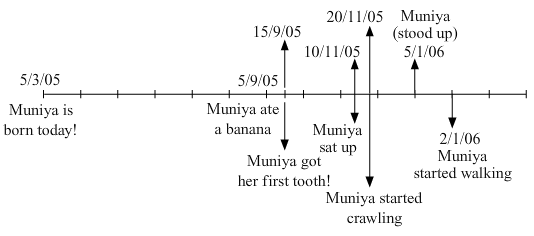
Ques 2: Muniya got her first tooth in September. How many months old was she then? How many months have passed from March to September? _____________
Ans: Muniya was born on 5 March 2005. She got her first tooth on 15 September 2005. We know that March is the third month of the year and September is the ninth month of the year. Thus, Muniya was 6 months old till 5 September 2005. Now, there are 10 more days for 15 September 2005. Hence, Muniya was 6 months 10 days old when she got her first tooth. Six months have passed from March to September.
Ques 3: How old was Muniya, when
(a) she first sat up? ____________
(b) she got her first tooth? ____________
Ans: (a) Muniya was born on 5 March 2005. She first sat up on 10 November 2005. Her age by that time = 5 March 2005 to 4 November 2005 + 6 days of November = 8 months 6 days She was 8 months 6 days old when she first sat up.
(b) Muniya got her first tooth on 15 September 2005. Her age by that time = 5 March 2005 to 4 September 2005 + 11 days of September = 6 months 11 days She was 6 months 11 days old when she got her first tooth.
Ques 4: What did she do first —
(1) walking/eating a banana?
(2) crawling/standing?
Ans: Muniya started walking on 2 February 2006. She started eating a banana on 5 September 2005. Now, 5 September 2005 comes before 2 February 2006, so she started eating first.
Muniya started crawling on 20 November 2005. She started standing up on 5 January 2006. Certainly, 5 January 2006 comes after 20 November 2005, so she started crawling first.
Page No 44:
Ques 1: Rani had a pet puppy. After 2 weeks it opened its eyes. She watched it grow like this:

Now make a time-line of this dog’s life in your notebook.
Ans:
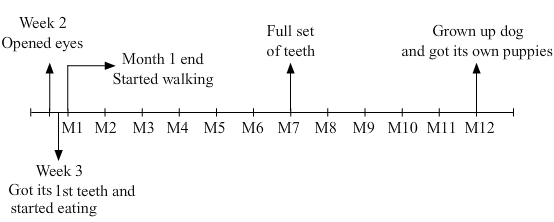
Ques 2: Note the differences between Muniya and Rani’s puppy:
| Positions | Muniya (age) | Puppy (age) |
| Started walking | ||
| Ate food for the first time | ||
| Got the first tooth |
Ans: Muniya was born on 5 March 2005. Muniya started walking on 2 February 2006. Let’s calculate her age from 5 March 2005 to 2 February 2006. Number of days in March 2005 = 31 − 4 = 27 Number of months from April 2005 to January 2006 = 10 Number of days in February 2006 = 2 So, she was 10 months 29 days old when she started walking.
Now, let’s calculate Muniya’s age when she ate food for the first time.
She ate for the first time on 5 September 2005. So, her age will be calculated from 5 March 2005 to 5 September 2006. Time from 5 March 2005 to 4 September 2005 plus 1 day = 6 months 1 day So, she was 6 months 1 day old when she started eating for the first time.
Last, we need to find her age when she got her first tooth. She got her first tooth on 15 September. Her age at that time = 5 March 2005 to 4 September 2005 + 11 days of September = 6 months 11 days Muniya was 6 months 11 days old when she got her first tooth.
| Positions | Muniya (age) | Puppy (age) |
| Started walking | 10 months 29 days | After 4 weeks (1 month) |
| Ate food for the first time | 6 months 1 day | After 3 weeks |
| Got the first tooth | 6 months 11 days | After 3 weeks |
Difference between their ages when both started walking = Muniya’s age − Puppy’s age = 10 months 29 days − 1 month = 9 months 29 days
Difference between their ages when both ate food for the first time = Muniya’s age − Puppy’s age = 6 months 1 day − 3 weeks = 5 months 4 weeks 1 day − 3 weeks = 5 months 1 week 1 day
Difference between their ages when both got their first tooth = Muniya’s age − Puppy’s age = 6 months 11 days − 3 weeks = 5 months 4 weeks 11 days − 3 weeks = 5 months 1 week 11 days
Page No 45:
Ques 1: Find out
Here are the pictures of grandfathers posing for a photograph. Who looks the oldest to you?
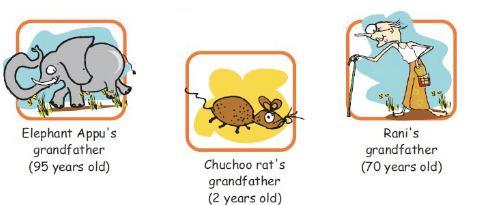
• How much older is Appu’s grandfather than Rani’s grandfather?_____________________
• Will Chuchoo’s grandfather ever grow as old as Appu’s grandfather?__________________
• How much younger is Chuchoo rat’s grandfather than Rani’s grandfather? _______________
Ans:
- Elephant Appu’s grandfather is 95 years old and Rani’s grandfather is 70 years old. Difference in their age = 95 − 70 = 25 years So, Appu’s grandfather is 25 years older than Rani’s grandfather.
- No, Chuchoo’s grandfather will never grow as old as Appu’s grandfather.
- Chuchoo’s grandfather is 2 years old and Rani’s grandfather is 70 years old.
Difference in their age = 70 − 2 = 68 years
So, Chuchoo’s grandfather is 68 years younger than Rani’s grandfather
Page No 47:
Ques 1: Now write which dates these stand for —
5/5/06 5 May 2006
20/5/06 _____________________
7/6/06 _____________________
1/1/07 _____________________
Ans: 5/5/06 5 May 2006
20/5/06 20 May 2006
7/6/06 7 June 2006
1/1/07 1 January 2007
Ques 2: Write these dates in numbers.
1 June 2006 ______________________
30 May 2006 ______________________
10 Aug 2007 ______________________
Ans:
1 June 2006 1/6/2006
30 May 2006 30/5/2006
10 Aug 2007 10/8/2007
Ques 3: How long did it take the letter to reach from Ajmer to Nagpur? ________________
Ans: Atif wrote the letter on 1/5/06, that is, 1 May 2006. Shabana received the letter on 6/5/06, that is, 6 May 2006. Time taken by the letter to reach Nagpur = 6 − 1 = 5 days So, the letter took five days to reach Nagpur.
Ques 4: How many days will Atif spend at his Nani’s place? ______________
Ans: Atif will reach his Nani’s place on 5/5/06, that is, 5 May 2006, and will be back on 20/5/06, that is, 20 May 2006. So, Total number of days Atif will spend at his Nani’s place = 20 − 5 = 15
Ques 5: Fill in the table:
| Dates | Number of days | ||
| From To | |||
| Shabana’s holidays | |||
| Atif’s holidays | |||
Who has got longer holidays — Shabana or Atif?
Ans: Shabana’s holidays are from 1 June 2006 to 9 August 2006. So, Days in June = 1 June 2006 to 30 June 2006 = 30 Days in July = 1 July 2006 to 31 July 2006 = 31 Days is August = 1 Aug 2006 to 9 Aug 2006 = 9 Shabana’s holidays = 30 + 31 + 9 = 70 days Now, Atif’s holidays are from 1/5/06 to 29/6/06. So, 1/5/06 is 1 May 2006 and 29/6/06 is 29 June 2006. Now, Days in May = 1 May 2006 to 31 May 2006 = 31 Days in June = 1 June 2006 to 29 June 2006 = 29 Atif’s holidays = 31 + 29 = 60 days
| Dates | Number of days | ||
| From To | |||
| Shabana’s holidays | 1 June 2006 | 9 August 2006 | 70 |
| Atif’s holidays | 1/5/06 | 29/6/06 | 60 |
So, Shabana has got longer holidays than Atif.
Page No 48:
Ques 1: On 15 May 2006 Chandran went to a shop to buy butter. He checked the packet to see if this butter was safe to eat. It was written on the packet — Best before 180 days from the date of packing. Then he checked the date of packing. It was 15/01/06. Help him find out if he should buy this butter or not. — In which month was the butter packed? ______ — Which month will it be 180 days after 15/01/06? _____ — Can Chandran eat it one 15th May 2006? _____
Ans:
— Butter was packed on 15/01/06, so the month of packing is January. — It was best to use the butter before 180 days from the date of packing. Let’s calculate 180 days from the date of packing. Days in January = 17 Days in February = 28 Days in March = 31 Days in April = 30 Days in May = 31 Days in June = 30 Days calculated so far = 17 + 28 + 31 + 30 + 31 + 30 = 167 Remaining days = 180 − 167 = 13 There will be 13 days in July. So, the date is 13 July 2006. — As it is safe to use the butter till 13 July 2006, Chandran can eat it on 15 May 2006.
Ques 2: Find Out
Which are the other things that come with an expiry date?
Ans: Almost every product comes with an expiry date. Things such as cold drinks, medicines, chips, chocolates, biscuits and sweets have an expiry date.
Ques 3: Find Out
What month and year is written as 07/05? _____________ Would it be safe to take the cough syrup in September 2005? ____________
Ans: The month and the year written as 07/05 are July and 2005, respectively.
No, it would not be safe to take the cough syrup in September 2005.
Page No 50:
| Time by your watch (12-hour clock) | Time by a 24-hour clock |
| 1 o’ clock in the afternoon | 13:00 hours |
| 2 o’ clock in the afternoon | 14:00 hours |
| 3 o’ clock in the afternoon | ____________ |
| 3:30 in the afternoon | 15:30 hours |
| 6 o’clock in the evening | ____________ |
| 9 o’ clock in the evening | ____________ |
| 12 o’ clock at midnight | ____________ |
| Time by your watch (12-hour clock) | Time by a 24-hour clock |
| 1 o’ clock in the afternoon | 13:00 hours |
| 2 o’ clock in the afternoon | 14:00 hours |
| 3 o’ clock in the afternoon | 15:00 hours |
| 3:30 in the afternoon | 15:30 hours |
| 6 o’clock in the evening | 18:00 hours |
| 9 o’ clock in the evening | 21:00 hours |
| 12 o’ clock at midnight | 00:00 hours |
Page No 51:
Ques 1: Suppose a train leaves at 8:30 at night. The time written on the Railway ticket would be _____________.
Ans: The train leaves at 8:30 at night, so the time would be 8:30 p.m. Time written on the railway ticket = 12:00 + 08:30 = 20:30 So, the time written on the railway ticket would be 20:30.
Ques 2: You must have noted the time of sunrise and sunset. Write here using am and pm.
| Time of Sunrise | |
| Time of Sunset |
| Time of Sunrise | 5:30 am |
| Time of Sunset | 7:30 pm |
Ques 3: Where have you seen a 24-hour clock being used?
1. ________________
2. ________________
3. ________________
Ans:
1. Airport
2. Railway station
3. Military
|
25 videos|123 docs|39 tests
|
FAQs on NCERT Solutions for Class 4 Maths - Tick Tick Tick
| 1. What are the NCERT Solutions for the chapter "Tick Tick Tick"? |  |
| 2. How can I access the NCERT Solutions for "Tick Tick Tick"? |  |
| 3. Are the NCERT Solutions for "Tick Tick Tick" available in multiple languages? |  |
| 4. Can I rely solely on the NCERT Solutions for "Tick Tick Tick" for exam preparation? |  |
| 5. How can the NCERT Solutions for "Tick Tick Tick" help me in scoring better in exams? |  |

|
Explore Courses for Class 4 exam
|

|













